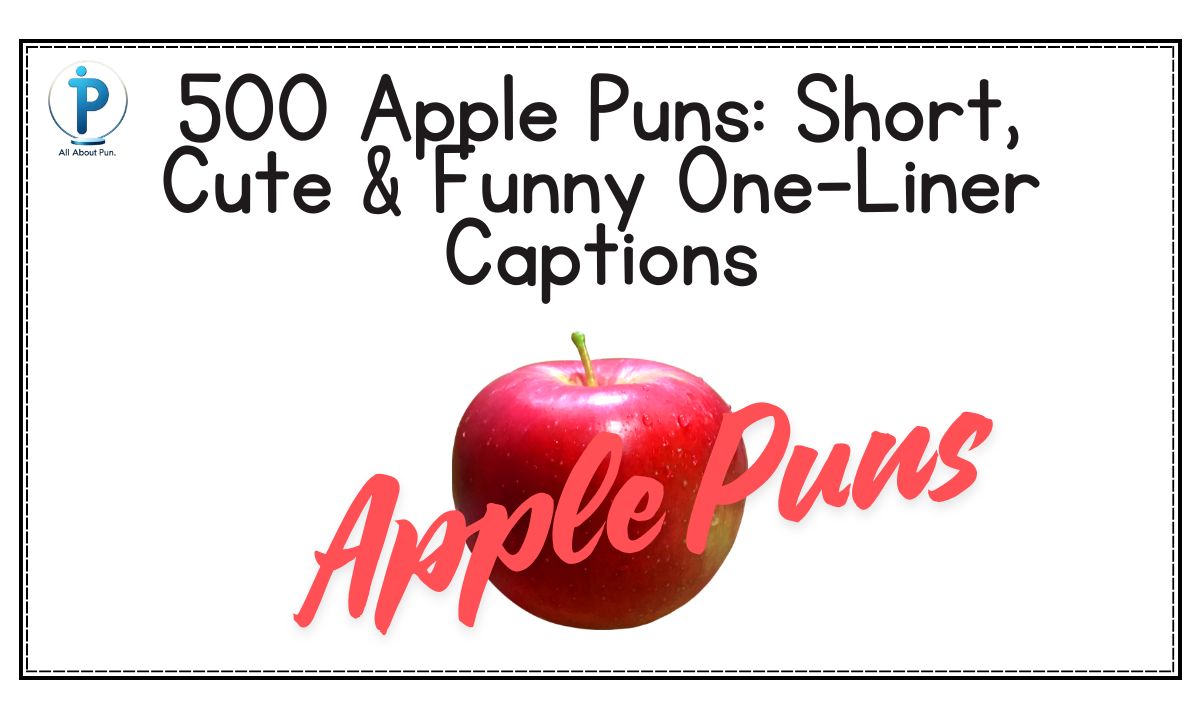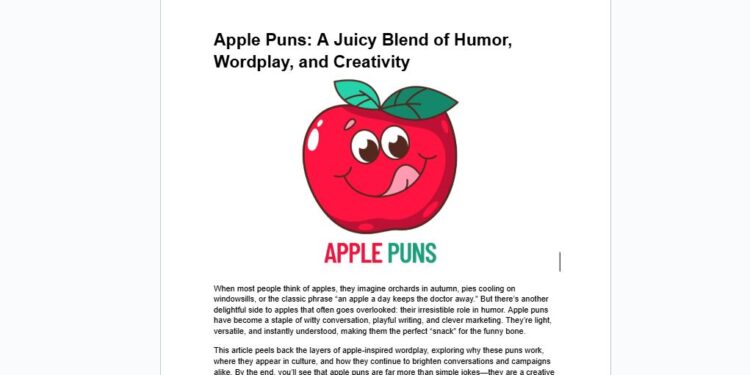Apple Puns When most people think of apples, they imagine orchards in autumn, pies cooling on windowsills, or the classic phrase “an apple a day keeps the doctor away.” But there’s another delightful side to apples that often goes overlooked: their irresistible role in humor. Apple puns have become a staple of witty conversation, playful writing, and clever marketing. They’re light, versatile, and instantly understood, making them the perfect “snack” for the funny bone.
This article peels back the layers of apple-inspired wordplay, exploring why these puns work, where they appear in culture, and how they continue to brighten conversations and campaigns alike. By the end, you’ll see that apple puns are far more than simple jokes—they are a creative force rooted in everyday life.
Why Apples Make Perfect Pun Material
Some words naturally lend themselves to playful wordplay, and “apple” is a perfect example. Its sound, its ties to health and knowledge, and its universal familiarity make it ripe for puns. Every part of the fruit—the core, the seeds, the peel—offers opportunities for clever twists, while familiar expressions like “apple of my eye” or “bad apple” provide ready-made springboards for humor. With just a little imagination, everyday sentences can be transformed into lighthearted jokes, whether it’s saying “This project is core to our success,” “You’re apple-solutely wonderful,” or “That idea is a-peel-ing.” Crafting apple puns takes little effort, which is exactly what makes them so much fun—the fruit practically writes its own punchlines.
Apples in Culture and Symbolism

To understand why apple puns resonate so well, it helps to look at the fruit’s deeper cultural roots. Apples have carried symbolic weight for centuries. In ancient mythology, they represented immortality and desire. In biblical tradition, they symbolized temptation and knowledge. In fairy tales, they often played a dramatic role—think of the poisoned apple in Snow White.
Because apples are already symbolic, they’re easy to transform into metaphors. When you say someone is “the apple of your eye,” you’re drawing on centuries of poetic tradition. Add a pun, and you give that tradition a playful twist.
How Apple Puns Connect People
At their heart, puns are social. They thrive in conversation, often shared as quick jokes or lighthearted commentary. Apple puns are especially effective in this role because they feel wholesome and accessible.
Imagine a teacher handing back graded papers with the note, “You’re apple-solutely brilliant.” Or a bakery chalkboard outside reading, “Slice, slice, baby.” These tiny moments of humor create smiles, spark conversation, and leave lasting impressions.
Unlike sarcasm or edgy jokes, apple puns feel universally safe. They don’t require explaining, they don’t offend, and they carry a natural sweetness that mirrors the fruit itself.
Seasonal Magic: Apple Puns in Autumn
Autumn is often seen as the unofficial season of apple puns, when orchards welcome visitors for apple picking, cider presses come alive, and the scent of fresh pies fills kitchens. During this time, wordplay flourishes everywhere, especially on social media with captions like “Picked the best of the bunch,” “Orchard you glad it’s fall?” or “Feeling apple-solutely cozy.” Festivals and farms embrace the trend as well, using pun-filled signs and merchandise to add a playful twist to seasonal traditions. From sipping warm cider to enjoying homemade desserts, apple-inspired wordplay has become an inseparable part of fall’s cozy charm.
.
Apple Puns in Marketing and Branding
Marketers love apple puns because they stick in the mind as easily as the fruit sticks in the hand, and a simple twist of language can turn an ordinary slogan into something unforgettable. A cider company might promote itself with the phrase “Pressed for perfection,” a snack brand could tempt buyers by inviting them to “Crunch into happiness,” and a juice bar might highlight its “core values.” Even beyond the food and beverage world, apple puns slip naturally into branding, as seen when tech enthusiasts joke about “biting into Apple,” a playful nod to both the fruit and the globally recognized technology company. This kind of wordplay shows just how deeply apple puns are embedded in public consciousness, making them powerful tools for humor and marketing alike.
Apple Puns in Education
Few symbols are as strongly tied to education as the apple. For generations, giving an apple to a teacher symbolized respect and gratitude. That connection naturally paved the way for apple-related humor in classrooms.
Bulletin boards, worksheets, and motivational posters are filled with lines like “You’re the apple of my class” or “Learning to the core.” Teachers know that puns make lessons more engaging, and students often remember the humor long after the day is over.
In this sense, apple puns are more than jokes—they are teaching tools that lighten the atmosphere and make knowledge feel more approachable.
Why Apple Puns Work Psychologically
Puns succeed because they surprise the brain. When you hear a word, you expect a certain meaning. A pun suddenly shifts that meaning, creating a tiny puzzle for your mind to solve. The “aha!” moment that follows produces a laugh.
Apple puns add an extra layer by tying into positive associations. Apples remind people of family, tradition, health, and comfort foods. When humor is linked to these warm feelings, the result is more than amusement—it’s genuine joy.
Crafting Your Own Apple Puns
Creating apple puns is easier than many people think. The trick is to start with a handful of apple-related words—like core, seed, orchard, crunch, or peel—and then blend them into everyday expressions. With just a little creativity, ordinary phrases can quickly turn into clever jokes that feel natural and lighthearted.
One simple technique is to replace similar-sounding words with apple-inspired twists. For instance, “appealing” can become “a-peel-ing,” while “absolutely” easily transforms into “apple-solutely.” These playful substitutions require almost no effort but create a memorable effect that instantly brings a smile.
Another approach is to play with familiar idioms or contexts. A phrase like “bad apple” can be spun into “glad apple” for a more positive tone, while “core issue” can shift into “sweet to the core.” Context also works wonders—imagine a cheerful orchard sign that says “Pick happiness” or a lunchbox note reading “Have a core-geous day.” The key to all these examples is simplicity: the best apple puns are short, clever, and delightfully unexpected.
Apple Puns in Pop Culture
From cartoons to comedy sketches, apple puns sneak their way into pop culture. Children’s shows often rely on food humor because it’s easy for young audiences to understand. Animated characters may declare themselves “the pick of the orchard” or boast about “core strength.”
On social media, apple puns are a go-to for seasonal posts and memes. Their universal familiarity makes them instantly shareable. A clever apple pun can travel far online, spreading smiles across the globe.
The Timelessness of Apple Humor
Trends in language change, but apple puns have a timeless quality. They don’t rely on niche references or complex setups. Instead, they thrive on simplicity, positivity, and universal understanding.
Every autumn brings a new wave of apple humor. Every Valentine’s Day sees cards with lines like “You’re the apple of my pie.” Every school year, classrooms echo with apple-related encouragements. These recurring cycles ensure apple puns never go out of style.
The Role of Apple Puns in Connection
In a fast-paced world, moments of levity are more valuable than ever. Apple puns serve as tiny connectors, offering warmth in emails, text messages, classroom notes, and marketing campaigns.
They remind us that humor doesn’t always have to be complex or cutting. Sometimes, the sweetest laugh comes from the simplest wordplay. Like the fruit itself, apple puns are small, nourishing, and universally appreciated.
Conclusion: Always Ripe for Humor
Apples may be one of the most ordinary fruits in the world, but they inspire extraordinary creativity. Apple puns prove that humor doesn’t need to be complicated to be effective. From orchards to offices, classrooms to coffee shops, they brighten conversations and strengthen connections.
As language continues to evolve, apple puns remain as fresh as ever. They are timeless, wholesome, and endlessly adaptable. So whether you’re crafting a witty slogan, writing a heartfelt card, or simply trying to add some sweetness to someone’s day, remember: the orchard of wordplay is always ripe for picking.
With every pun shared, you’re not just making someone laugh—you’re planting a seed of joy. And in that sense, apple puns are more than humor. They’re a reminder of how language, like fruit, can nourish us at the very core.


















































































